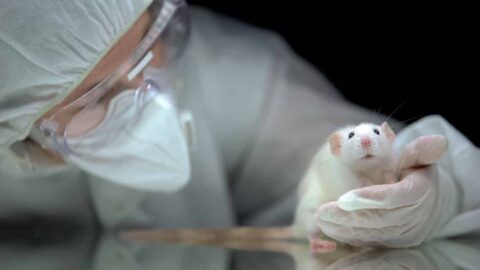Feature
Regenerative Agriculture Falls Short As a Climate Fix, New Study Finds
Research•5 min read
Perspective
Can paying for an animal testing-free future make people feel better about getting vaccinated? Jessica Scott-Reid explores the novel new concept of animal testing offsets.


Words by Jessica Scott-Reid
While attending the first annual Canadian Animal Law Conference in 2019 in Halifax, there was much talk among attendees about how we could offset our carbon footprints produced from flying to and from the event (for animal advocates, caring about the environment typically goes hand-in-hand). A colleague from Switzerland noted there are websites that allow you to put in your flight details so you can see the emissions you are responsible for, then offer ways to “offset” them by paying for trees to be planted or waterways to be cleaned. As it would turn out, my 5,000-kilometer flight cost me just over twenty bucks to offset, which went to helping someone in China give up their coal stove for one that is solar-powered.
Seemed simple enough, I thought. Though perhaps my offsetting was more self-soothing than environmentally heroic. But that’s generally how personal offsets work, right? They are a means to both invest in something helpful and productive going forward, while also paying to “feel better” about partaking in something harmful.
That was my last flight before the pandemic hit, and today as we now find ourselves in a world of flight-less Zoom conferences and mass vaccinations, people are starting to talk about applying the offset concept to another dilemma: animal testing.
The idea was first mentioned on the Paw & Order podcast, a Canadian animal law podcast produced by advocacy group Animal Justice, of which I am a co-host. Animal Justice’s executive director, Camille Labchuk and I were interviewing Dr. Charu Chandrasekera, founder of the Canadian Centre For Alternatives to Animal Methods (CCAAM), about her work to end animal testing by developing human biology-based methods (think stem cells, 3-D printing, disease in a dish, etc.). Near the end of the discussion we were talking about ways people could support Chandrasekera’s work, including donating to her privately funded research center.
And that’s when it happened. My super smart friend Camille, proclaimed, “I am going to make a substantial donation [to CCAAM] when I get my second [COVID-19] vaccine. Of course I am getting it, but I am not happy that it is tested on animals, so to try to mitigate my guilt about that, I am going to make a donation to try to be part of the solution.”
At that moment, the idea of animal testing offsets was born.
“I think it’s a brilliant idea, absolutely brilliant,” says Chandrasekera to Sentient Media, referring to the idea of donating to organizations working to end animal testing and/or saving animals from laboratories (such as The Beagle Freedom Project), after getting the COVID-19 vaccine. Different from fighting for animals in the food system, in fashion or in entertainment, or even animals used in some product testing, she says fighting for animals in medical testing and research must take a different approach.
“Every other aspect of animal exploitation can be dealt with on a personal level, because you have clear cut choices,” says, Chandrasekera, meaning our ability to eat an animal-free diet, to avoid zoos and circuses, and buy cruelty-free products. But government regulated systems that require the use of animal models in medical testing and research do not currently offer an alternative. “There’s no way to really boycott the system,” she says—and we all need to stay alive. So to fight this archaic system that demands animal testing, while still participating in it, we can support the development and validation of alternatives to animal methods and push for system change and for a future without animal testing.
What is standing in the way though, of the critical and innovative work of CCAAM, and in the U.S. the Center for Alternatives to Animal Testing (CAAT), is funding.
According to the Canadian Council on Animal Care, a non-government agency that oversees the treatment of animals in research, there were over 4.5 million animals used in publicly funded research and testing in Canada in 2019. That does not include animals used by private institutions such as pharmaceutical companies. The Canadian Institutes of Health Research, Canada’s federal funding agency, has an annual budget of $1 billion with nearly half of that going to biomedical research.
In the U.S., the Humane Society of The United States estimates around 25 million animals are used annually in research and testing across the country. Watchdog group White Coat Waste Project (another organization worth considering for your offset) estimates over $15 billion is spent annually on animal testing by the National Institute of Health, in addition to billions spent on testing done by the NSF, FDA, USDA, CDC, DOD, and other federal agencies.
This is all despite the fact that more than 90 percent of drugs tested and found to be safe and effective in animal models fail in human clinical trials, and while governments continue to throw money at animal testing, both CCAAM and CAAT survive without any major federal funding. Their work is made possible by philanthropy initiatives and personal donations.
So if you, like my animal-loving friend Camille and I, choose to get vaccinated against COVID-19, but aren’t happy about it because of the mandatory animal testing, or if you are on the fence about getting vaccinated because of this dilemma, perhaps an animal testing offset is for you. It won’t save the animals suffering today, but it will help reduce the suffering that is to come. “It is a donation to the future,” says Chandrasekera, a chance to contribute to what will be the “legacy” of animal-free medicine.
Or at least, like paying 20 bucks after flying across the country, it will make you feel a bit better.